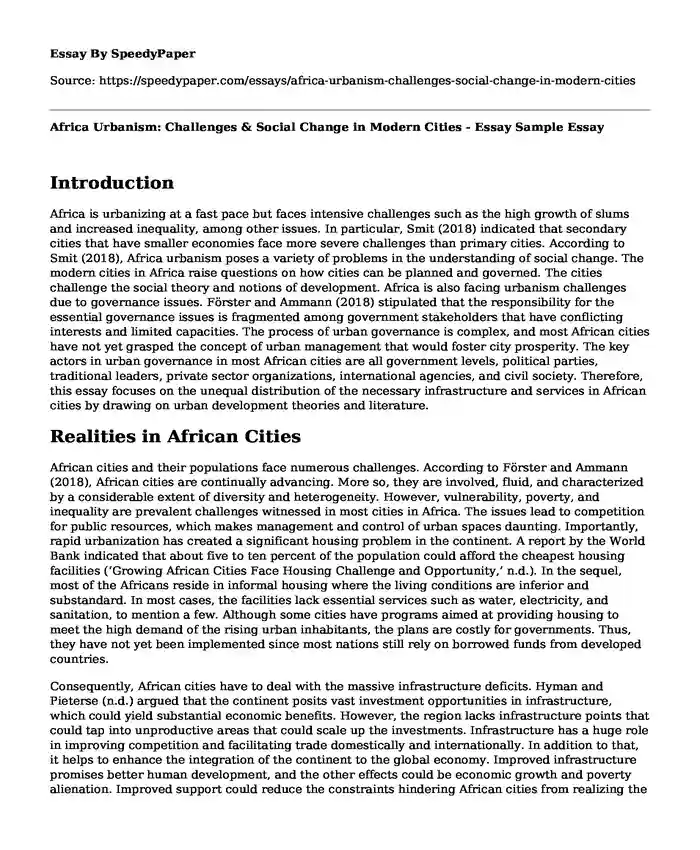Introduction
Africa is urbanizing at a fast pace but faces intensive challenges such as the high growth of slums and increased inequality, among other issues. In particular, Smit (2018) indicated that secondary cities that have smaller economies face more severe challenges than primary cities. According to Smit (2018), Africa urbanism poses a variety of problems in the understanding of social change. The modern cities in Africa raise questions on how cities can be planned and governed. The cities challenge the social theory and notions of development. Africa is also facing urbanism challenges due to governance issues. Förster and Ammann (2018) stipulated that the responsibility for the essential governance issues is fragmented among government stakeholders that have conflicting interests and limited capacities. The process of urban governance is complex, and most African cities have not yet grasped the concept of urban management that would foster city prosperity. The key actors in urban governance in most African cities are all government levels, political parties, traditional leaders, private sector organizations, international agencies, and civil society. Therefore, this essay focuses on the unequal distribution of the necessary infrastructure and services in African cities by drawing on urban development theories and literature.
Realities in African Cities
African cities and their populations face numerous challenges. According to Förster and Ammann (2018), African cities are continually advancing. More so, they are involved, fluid, and characterized by a considerable extent of diversity and heterogeneity. However, vulnerability, poverty, and inequality are prevalent challenges witnessed in most cities in Africa. The issues lead to competition for public resources, which makes management and control of urban spaces daunting. Importantly, rapid urbanization has created a significant housing problem in the continent. A report by the World Bank indicated that about five to ten percent of the population could afford the cheapest housing facilities (‘Growing African Cities Face Housing Challenge and Opportunity,’ n.d.). In the sequel, most of the Africans reside in informal housing where the living conditions are inferior and substandard. In most cases, the facilities lack essential services such as water, electricity, and sanitation, to mention a few. Although some cities have programs aimed at providing housing to meet the high demand of the rising urban inhabitants, the plans are costly for governments. Thus, they have not yet been implemented since most nations still rely on borrowed funds from developed countries.
Consequently, African cities have to deal with the massive infrastructure deficits. Hyman and Pieterse (n.d.) argued that the continent posits vast investment opportunities in infrastructure, which could yield substantial economic benefits. However, the region lacks infrastructure points that could tap into unproductive areas that could scale up the investments. Infrastructure has a huge role in improving competition and facilitating trade domestically and internationally. In addition to that, it helps to enhance the integration of the continent to the global economy. Improved infrastructure promises better human development, and the other effects could be economic growth and poverty alienation. Improved support could reduce the constraints hindering African cities from realizing the benefits of globalization (Hyman & Pieterse, n.d.). Hyman and Pieterse (n.d.) stated that the financing required to close the infrastructure deficits in Africa is about 93 billion dollars. Explicitly, this could pose a challenge for Africa due to their financial incapability to raise such an amount annually. However, Hyman and Pieterse (n.d.) claimed that a variety of options exists that could lead to new finance sources in the continent. Some solutions include private financing, forming new partnerships, and reducing wastage of the investments generated from various sources.
References
Förster, T., & Ammann, C. (2018). African cities and the development conundrum. International Development Policy, 2018(10), 3–25. https://doi.org/10.4000/poldev.2621
Growing African Cities Face Housing Challenge and Opportunity. (n.d.). World Bank. https://www.worldbank.org/en/news/press-release/2015/12/01/growing-african-cities-face-housing-challenge-and-opportunity
Hyman, K., & Pieterse, E. (n.d.). Infrastructure deficits and potential in African cities. The SAGE Handbook of the 21st Century City, 429–452. https://doi.org/10.4135/9781526402059.n23
Smit, W. (2018). Urban governance in Africa: An overview. International Development Policy, 2018(10), 55–77. https://doi.org/10.4000/poldev.2637
Cite this page
Africa Urbanism: Challenges & Social Change in Modern Cities - Essay Sample. (2023, Aug 21). Retrieved from https://speedypaper.net/essays/africa-urbanism-challenges-social-change-in-modern-cities
Request Removal
If you are the original author of this essay and no longer wish to have it published on the SpeedyPaper website, please click below to request its removal:
- Womens suffrage
- Race Relationship Essay Sample
- Free Essay on the Immigrant Experience in American History
- Free Essay: Status and Suggestions of Multimedia Information Technology Application Teaching
- Free Essay: Collaborative Initiative
- Free Essay: Processed Food vs. Healthy food for African-Americans
- Article Analysis Essay: Sources of the African American Past: Primary Sources in American History
Popular categories





